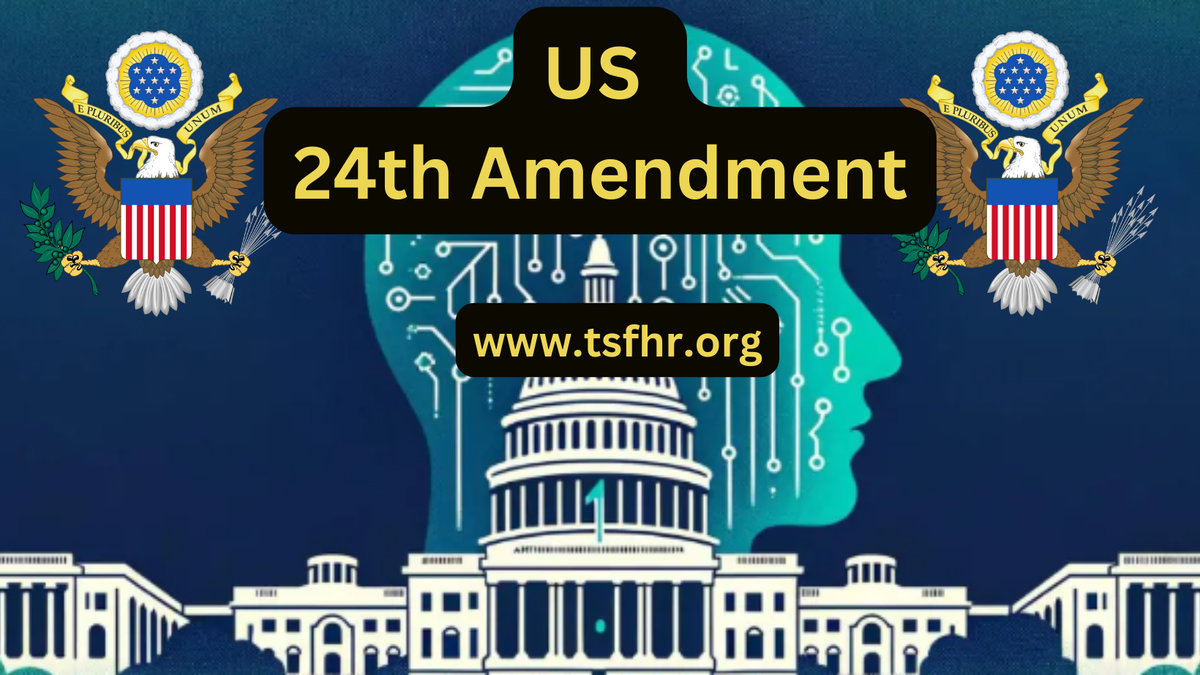What is the 24th Amendment in Simple Terms: Learn about the 24th Amendment in simple terms. This article explains how it eliminated poll taxes and protected voting rights for all U.S. citizens, making it easier for everyone to vote.
Introduction:
The 24th Amendment, ratified in 1964, plays a significant role in protecting the voting rights of U.S. citizens. Specifically, it abolished poll taxes, which were used as a barrier to voting, particularly targeting African Americans and low-income voters. In this article, we’ll break down what the 24th Amendment means in simple terms, why it was created, and its importance in ensuring fair voting practices for all Americans.
What is the 24th Amendment in Simple Terms:
What is the 24th Amendment in Simple Terms?
The 24th Amendment is a law that eliminates poll taxes. Before this amendment, voters had to pay a tax to vote in federal elections. These taxes disproportionately affected poor and minority voters, especially in the South. The 24th Amendment made it illegal to require a poll tax to vote in national elections, ensuring that everyone, regardless of income, could exercise their right to vote.
When Was the 24th Amendment Created?
The 24th Amendment was ratified on January 23, 1964. It was a crucial victory for civil rights activists during the Civil Rights Movement, aiming to break down barriers to voting and ensure equality at the polls.
Why Was the 24th Amendment Created?
The 24th Amendment was created in response to the practice of poll taxes, which were used in some states, especially in the South, to disenfranchise African American and poor voters. These taxes acted as a financial barrier to voting, and many people could not afford to pay them. The 24th Amendment sought to eliminate this obstacle and guarantee that all citizens had equal access to voting.
Why Is the 24th Amendment Important?
The 24th Amendment is important because it removed a discriminatory practice that made it harder for poor and African American citizens to vote. By abolishing poll taxes, it ensured that every American citizen had the right to vote without being burdened by a financial requirement, helping to make elections more democratic and accessible for all.
24th Amendment Rights
The 24th Amendment guarantees the right to vote in federal elections without paying a poll tax. It ensures that no citizen can be denied the ability to vote because of their inability to pay a tax. This was especially important in breaking down discriminatory voting practices that were used to suppress the votes of marginalized groups.
24th Amendment Examples
- Abolition of Poll Taxes: After the ratification of the 24th Amendment, any state or locality that required a poll tax to vote in federal elections was no longer allowed to do so.
- Equal Voting Access: The 24th Amendment helped ensure that citizens of all income levels could participate in presidential and congressional elections without facing financial barriers.
Examples of the 24th Amendment Being Violated
- Poll Tax Continued in Some States: Even after the 24th Amendment’s passage, some states continued to use poll taxes or other voter suppression tactics, like literacy tests. However, these were eventually challenged and deemed unconstitutional.
- Voter ID Laws: While the 24th Amendment specifically addresses poll taxes, some modern voting laws, such as strict voter ID laws, have been seen as creating indirect barriers to voting, though these are often debated in the courts.
FAQs Section:
Q1: What is the 24th Amendment in Simple Terms for Kids?
The 24th Amendment says that people don’t have to pay money to vote in national elections. It makes sure everyone can vote, even if they don’t have a lot of money.
Q2: What Does the 24th Amendment Say in Simple Words?
The 24th Amendment says that no one can be stopped from voting because they can’t pay a tax. This law made voting easier for many people, especially those who were poor.
Q3: What is the 24th Amendment of the Bill of Rights in Simple Terms?
The 24th Amendment is not part of the Bill of Rights, but it is an important constitutional amendment. It removed poll taxes, which were used to stop poor people from voting in federal elections.
Q4: What Are Some 24th Amendment Examples?
End of Poll Taxes: After the 24th Amendment, no state could charge people to vote in presidential or congressional elections.
Protection of Voting Rights: The 24th Amendment helped protect the voting rights of low-income Americans who had been disenfranchised by poll taxes.
Q5: What Does the 24th Amendment Mean in Kid Terms?
The 24th Amendment means that everyone has the right to vote, no matter how much money they have. Before the amendment, some people had to pay to vote, but now, no one can be asked to pay.
Conclusion:
The 24th Amendment is a critical part of U.S. history, ensuring that all citizens, regardless of their income, have equal access to vote in federal elections. By abolishing poll taxes, it broke down a key barrier to voting, promoting fairness and democracy. The 24th Amendment serves as a reminder of the ongoing fight for civil rights and equality in America.
Other Amendments Articles
